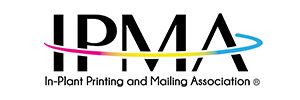Let’s pretend we are watching one of those cartoons in which a character has a devil on one shoulder and an angel on the other. The character is an in-plant employee in a very busy production room. The production room is operating effectively and the devil doesn’t like that.
“Teamwork? I hate teamwork!”
He whispers in the ear of the employee.
“Looks to me like you are the only one doing all the work around here. They don’t pay you enough. So-and-so isn’t doing their fair share. I think this place is taking advantage of you.”
After a while, the employee starts to agree.
“Yes, I see what you are saying. What can I do?”
The devil thinks for a minute.
“You have to be smart about this. You have to send a message without being too direct. Let’s start with a few changes in your work habits.”
The devil produces a folded piece of paper.
“Here,” he says in a low voice. “Read this. This will send them the message you want to send them.”
The employee opens the folded paper and begins reading.
How to Stick-it to the People Who Don’t Appreciate You Anymore
- When a garbage can or recycle bin is full, push down on the contents as hard as you can. Surely you can fit more in there.
- If you empty a carton of paper, just let the empty box sit where it is. Someone else probably has more time for this kind of thing than you do.
- If you notice a supply item is getting low or you just happened to be the person who took the last one, don’t take any action. It isn’t your problem; it is someone else’s problem.
- If you see paper scraps or other debris on the production room floor, tell yourself that you do not know how it got there. Better still, pretend you didn’t see it.
- If you see empty table space, that means you can put stuff there. Spreading out is easier than putting stuff away. Putting stuff under tables is also very handy.
- Open as many different kinds of paper as you can and leave piles of it sitting around without labels. As long as you can personally identify the paper with at least some degree of accuracy, your own work can be accomplished and you may save yourself a few extra steps in the long run.
- When someone asks you a question, be sure to have non-helpful answers at the ready. Strong examples are phrases such as “Beats me!” and “I have no clue!” (Answers such as “Beats me!” and “I have no clue!” also work well whenever something is printed wrong, spilled or damaged.)
- If you have to leave the shop and you have unfinished work, do not leave any notes for anyone. They can figure it out for themselves.
- Keep to yourself and try your best not to know what else is going on in the shop. What’s theirs is theirs and what’s yours is yours.
- Whenever possible, say or do something passive-aggressive. Passive aggressive behavior can make you feel better for a few minutes while you wait for things to change. Calling off sick when you are not truly sick is just one example of effective passive-aggressive behavior.
After the employee is finished reading, he turns the paper over.
“What’s this here printed on the other side?”
The devil tries to answer but is interrupted by the angel.
“Oh that? That’s nothing. You can ignore…”
SILENCE! ENOUGH OUT OF YOU!
The angel turns his attention to the employee.
“If you truly want to see positive change,” he says, “and you want to go home at the end of the day feeling good again about your work, passive-aggressive behavior is not going to get the job done.”
The employee begins reading the other side of the paper.
How to Feel Better About Work Again
- Be the change you want to see. Demonstrate a positive attitude, speak a kind word, and make every effort to help others. This kind of behavior can be contagious.
- If you see something that needs the attention of a responsible employee, do what needs to be done. Fill out that requisition form. Send that email. Empty the trash. Re-stock that paper shelf.
- Never leave a mess. A clean work environment is a safe and more productive work environment. Remember, your production room is shared space. Sloppiness reflects poorly on you and impacts the whole team.
- Say thank you. Demonstrate appreciation.
- As you work, think of the next person in the production line. When you hand a job off in the production process, ask yourself what you can do to make it easier or more clear for the next person to touch a job.
- Communicate in a positive manner. As that great, angelic saint and 2-time Super Bowl winning champion Peyton Manning once said, “If you chew a guy out and he walks away pouting, you failed.”
- When someone asks you a question, and you don’t know the answer tell that person you don’t know and then ask them what you can do to help.
- If you need to leave the shop and you have unfinished work, leave very clear notes. A late job or redo reflects badly on everyone. A job well done reflects positively on the entire team.
- If you find yourself as the loner, you are doing it wrong.
- Know this: Anytime you are not at work, the rest of the team has to step up in order to do their work and your work. Think of others as you would want them to be thinking of you.
Passive-aggressive behavior never works. Not Ever. Teams can never thrive whenever passive-aggressive behavior exists within the team.
The opposite of passive-aggressive behavior is non-aggressive, assertive behavior.
This involves describing your feelings, thoughts, opinions, and preferences directly to another person in an honest and appropriate way that respects both you and the other person.
It also involves demonstrating your respect for others through your behavior in the work environment.

Dwayne Magee, CGCM and former IPMA President, is celebrating his 19th year at Messiah University in Mechanicsburg, PA as Director of Messiah Press and Postal Services. His team of 11 print and mail professionals support the communication needs of Messiah University by producing materials that inform, engage, and connect the broader Messiah community in support of the University’s mission. Prior to his work at Messiah, Dwayne served as assistant manager and ISO coordinator for 17 years at AlphaGraphics in Camp Hill, Pennsylvania. Outside of work, Dwayne serves on the foundation board for CPARC, an organization supporting the needs of individuals with intellectual and developmental disabilities. He is also an English major at Messiah and enjoys exploring spiritual, environmental, and social concerns through creative writing and the arts. He is the father of two children, Garrison and Grayson, and he currently resides in Mechanicsburg, Pennsylvania with his wife Sue and their two dogs, Molly and Solomon.
